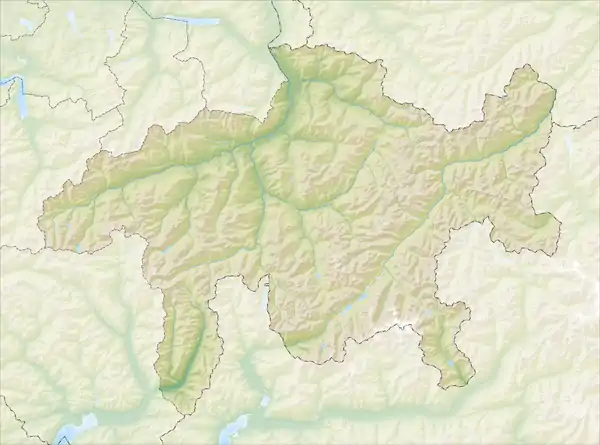Calfreisen | |
|---|---|
 Calfreisen, on southern end is Ruine Bernegg and further down in the valley is Castiel church. | |
 Coat of arms | |
Location of Calfreisen | |
 Calfreisen  Calfreisen | |
| Coordinates: 46°50′N 9°35′E / 46.833°N 9.583°E | |
| Country | Switzerland |
| Canton | Graubünden |
| District | Plessur |
| Area | |
| • Total | 5.13 km2 (1.98 sq mi) |
| Elevation | 1,249 m (4,098 ft) |
| Population (2010) | |
| • Total | 54 |
| • Density | 11/km2 (27/sq mi) |
| Time zone | UTC+01:00 (Central European Time) |
| • Summer (DST) | UTC+02:00 (Central European Summer Time) |
| Postal code(s) | 7027 |
| SFOS number | 3922 |
| Surrounded by | Castiel, Maladers, Praden, Says, Trimmis |
| Website | www SFSO statistics |
Calfreisen (Romansh: ⓘ) is a former municipality in the district of Plessur in the canton of Graubünden in Switzerland. On 1 January 2013 the former municipalities of Calfreisen, Castiel, Langwies, Lüen, Molinis, Peist and St. Peter-Pagig merged into the municipality of Arosa.[1]
History
Calfreisen is first mentioned in 1156 as Caureisene.[2]
Geography
Before the merger, Calfreisen had a total area of 5.2 km2 (2.0 sq mi).[3] Of this area, 49.5% is used for agricultural purposes, while 30% is forested. Of the rest of the land, 1.7% is settled (buildings or roads) and the remainder (18.8%) is non-productive (rivers, glaciers or mountains).[3]
The former municipality is located in the Schanfigg sub-district of the Plessur district. It is on the north slope of the Schanfigg mountain.
Demographics
Calfreisen had a population (as of 2010) of 54.[3] As of 2008, 20.4% of the population was made up of foreign nationals.[4] Over the last 10 years the population has grown at a rate of 12.5%.[3]
As of 2000, the gender distribution of the population was 55.6% male and 44.4% female.[5] The age distribution, as of 2000, in Calfreisen is; 7 children or 15.6% of the population are between 0 and 9 years old. 4 teenagers or 8.9% are 10 to 14, and 1 teenager is 15 to 19. Of the adult population, 2 people or 4.4% of the population are between 20 and 29 years old. 6 people or 13.3% are 30 to 39, 8 people or 17.8% are 40 to 49, and 6 people or 13.3% are 50 to 59. The senior population distribution is 1 person is between 60 and 69 years old, 3 people or 6.7% are 70 to 79, there are 7 people or 15.6% who are 80 to 89.[4]
In the 2007 federal election the most popular party was the SVP which received 63.3% of the vote. The next three most popular parties were the SP (28.3%), the CVP (5%) and the FDP (3.3%).[3]
In Calfreisen about 77.3% of the population (between age 25–64) have completed either non-mandatory upper secondary education or additional higher education (either University or a Fachhochschule).[3]
Calfreisen has an unemployment rate of 0.4%. As of 2005, there were 6 people employed in the primary economic sector and about 3 businesses involved in this sector. 1 person is employed in the secondary sector and there is 1 business in this sector. 1 person is employed in the tertiary sector, with 1 business in this sector.[3]
The historical population is given in the following table:[2]
| year | population |
|---|---|
| 1808 | 57 |
| 1850 | 98 |
| 1900 | 58 |
| 1950 | 60 |
| 1980 | 34 |
| 2000 | 45 |
Languages
Most of the population (as of 2000) speaks German (93.3%), with the rest speaking Romansh ( 6.7%).[3]
The historical language use is given in the following table:
| Languages in Calfreisen | ||||||
| Languages | Census 1980 | Census 1990 | Census 2000 | |||
| Number | Percent | Number | Percent | Number | Percent | |
| German | 32 | 94.12% | 53 | 98.15% | 42 | 93.33% |
| Romansh | 2 | 5.88% | 0 | 0.00% | 3 | 6.67% |
| Population | 34 | 100% | 54 | 100% | 45 | 100% |
References
- ↑ Nomenklaturen – Amtliches Gemeindeverzeichnis der Schweiz Archived 2015-11-13 at the Wayback Machine (in German) accessed 9 February 2013
- 1 2 Calfreisen in German, French and Italian in the online Historical Dictionary of Switzerland.
- 1 2 3 4 5 6 7 8 Swiss Federal Statistical Office Archived January 5, 2016, at the Wayback Machine accessed 11 February 2013
- 1 2 Graubunden Population Statistics Archived August 27, 2009, at the Wayback Machine (in German) accessed 21 September 2009
- ↑ Graubunden in Numbers Archived September 24, 2009, at the Wayback Machine (in German) accessed 21 September 2009
External links
- Official website (in German)
- Calfreisen in German, French and Italian in the online Historical Dictionary of Switzerland.